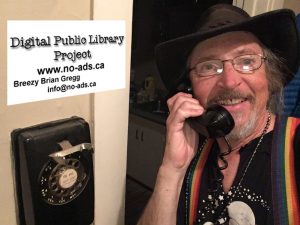Impressum
This website [ https://no-ads.ca ] will never ask you for money or advertise for a third party.
Its purpose is to change minds and move legislation.
Presently the author Breezy Brian Gregg believes he has no intentions of direct personal monetary gain from this work and sees it only as an effort to bring into being a Canadian National Online Public Library, to serve all Canadians equally and fairly. Credit for the vision must also be shared with the many people who have discussed this with the author.
Dear Reader
It is my opinion that a Canadian National Online Public Library could more safely and efficiently provide services now provided by Facebook, Google, YouTube and Twitter =X.
One thing has remained constant over the years in the evolution of my understanding of media economics — relying on advertising to fund media services is bad for society and bad for most individuals.
Before pointing out why the advertising-funding model is so bad I am going to outline the path that has led me to my present position of advocating for democratic-media-reform.
At one time I thought we should outright abolish advertising in the media. The problem was though this is not really possible because it would go against freedom of expression guarantees. Although third party advertisimg is very bad, I don’t think it is worth getting rid of media-advertising by trading off freedom of expression guarantees.
Then I saw what I thought was a way to get rid of media-advertising without banning it. I looked at its most obvious flaw which is that most people in general do not like invasive advertising. Then I supposed that if we could find another option for funding media then, that option would have a big advantage in capturing and monopolizing the market that is presently (2023) captured and monopolized by mostly foreign private firms. I don’t think anyone would deny that given the option of having advertising-free access to media-content and other online communications services, people would take that opportunity and the result would be the end of third party advertising in the online media.
The first solution I considered was to publicly fund media on a grand scale. I reasoned out in detail how a publicly funded automatic public pay per use online media platform could work. That fair and safe way to fund media-content production is described further below. A problem though with this idea was, although it would get rid of advertising in the media with all its downsides for our wallets and out democracy, it would open up the frightening possibility of the development of a Pravda-like state controlled media.
Now I have what I think is a very good solution. We do not want government controlling media nor do we want private firms (especially foreign private firms) to be controlling our online media. There is though a third option and that is what I am advocating. NGOs (non governmental organizations) are not private businesses. Obviously they are not government organizations either. The NGO most similar to the service being proposed here is, Wikipedia. Wikipedia is not a business and it is not a government organization. It is the fifth most popular site on the internet. It does not require that users be exposed to advertising. It does not track users behavior. It does not take a profit.
I am advocating that as a society we should create and fund what I call an Online Public Library.
It would be a NGO that provides the digital media services we want. —
- search engine services,
- social media services,
- universal access to digital-media-content, and
- a fair way to fund media-content production
Fair and safe way to fund media-content production
— automatic payment from the library to the copyright holder based on use
— manual clawback of the payment to the library if the user deems the content to be inappropriate or unworthy (This is to discourage those who might like to profit from deception.)
— inverse popularity pay scale (where the first few thousand instances of use would pay out at a high rate and then the rate would taper off) This would sustain production of local news and other content that serves smaller niche audiences.
— copyright expiry based on reaching a high cap on funding instead of being based on time (This is to limit viral content from consuming the majority of the available funds.)
Importantly it would provide these services;
- without requiring that users be exposed to third party advertising,
- without tracking users behaviour,
- without taking a profit, and
- without creating a huge opportunity for the super rich to buy a dominating voice in the public conversations that determine what is politically possible.
NO ADS CANADA argues, other benefits of transitioning to a Public Library model for online-media-services are that:
- It will get rid of the annoyance of interruption from advertising
- It will protect our democracy from money in politics
- It will save us money by lowering our cost of living
Why are there no economic studies asking if advertising boosts the cost of living?
Questions? Thank you. I welcome your comments and questions.
This website [ https://no-ads.ca ] will never ask you for money or advertise for a third party.
Its purpose is to change minds and move legislation.
